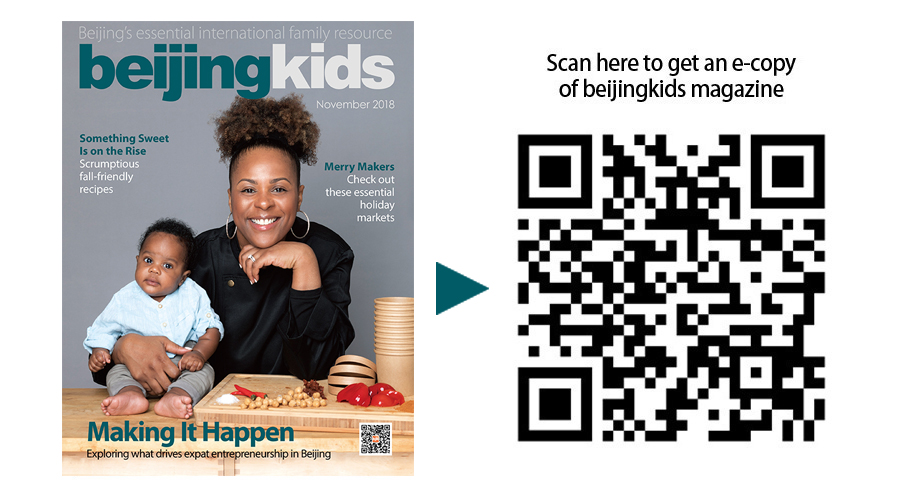Since our magazine first hit the Beijing streets some 11 years ago, we’ve met a lot of enterprising people who took a chance and seized the many opportunities in this city, which might not have been available to them in their home countries.
Such a person is Dominic Johnson-Hill, the founder of Plastered 8, perhaps Beijing’s most iconic pop-up t-shirt brand.
His clever reinterpretations have made the city’s hackneyed imagery fashionable, in the form of funky t-shirts. Five years after Johnson-Hill last graced our pages (in our Talking Shop column), he’s back, this time not to talk about the continued success of his Plastered brand, but to help jump-start the careers of budding student entrepreneurs from the Canadian International School of Beijing (CISB).
 Henry, 16: What do you do when you face economic challenges
Henry, 16: What do you do when you face economic challenges
Dominic: A lot of people who come to China and do business lose their moral compass. I believe you should be strong on that side and never lose your values. If I face an economic challenge, my number one thing would be to try to be even stronger or more aggressive on marketing, and get even more people to talk about the brand. A lot of companies that encounter economic challenges cut back on marketing first because they see it as unnecessary or non-essential. Of course, I would evaluate the cost of the product and try to bring it down as much as possible.
 Samuel, 16: What’s your biggest challenge so far?
Samuel, 16: What’s your biggest challenge so far?
Dominic: It’s understanding myself as an entrepreneur: I started to grow beyond what I wanted, I started to lose a lot of money and became very unhappy. I think that the mindset of many entrepreneurs is all about growth, or what they like to call “scale”. But I realized it’s somebody else’s dream and not mine. As my business became well known, I started to expand beyond what I originally wanted, so I had opened more stores in Beijing and Shanghai. One day I stopped myself and said, “What am I doing?” and then closed down all of those different businesses and brought them just back to Beijing. I realized that the reason that I got into Plastered is because I want to have fun and create things.
 Bryan, 16: How did you learn about business, considering that you dropped out of school?
Bryan, 16: How did you learn about business, considering that you dropped out of school?
Dominic: I picked it up by doing it. I’m not proud of dropping out of school, but it’s just that school wasn’t for me. Where I went to study in England was traditional, and it wasn’t like it is now. It didn’t fit me; I was very much outside of the mainstream of learning: I was dyslexic and had ADHD and so I dropped out. But when I started traveling on my own, I learned to stand on my two feet and realized I could pick up languages and skills quite quickly if I just got my hands dirty. And so I found business a natural step for me and quite enjoyed it. I found that business is about building relationships. If you guys learn business, there’s no reason you can’t start businesses even at your age now.
 Joanna, 16: You said you traveled around the world, so where did you get your money from?
Joanna, 16: You said you traveled around the world, so where did you get your money from?
Dominic: The first job I got in England to make money, I made GBP 800 working in a donkey sanctuary – of all places, I looked after donkeys! I got other jobs in Zimbabwe, Bolivia, and India. When I arrived in China in 1993, there were only two bars in Beijing and then you’d find yourself sitting next to the COO of Boeing at that bar, and I was like, “Hey, what do you do?” He said, “I’m the COO of Boeing,” and I responded, “Cool! Can you give me a job?” Eventually, I would be teaching his personal assistant English. So basically, I just did jobs and I started my first business in 1995. So it’s just meeting people, relationships, being a good person, and whatever job I did, I did it better that you would ever imagine.
 Britt, 17: What’s the best way to attract people when you do online business?
Britt, 17: What’s the best way to attract people when you do online business?
Dominic: Do something incredible. First of all, I like the product to be able to speak for itself as well. I create a product that I hope would spark a conversation. A lot of people make average products and spend millions trying to get people to buy them. I’ve made products that have gone viral because they’re ridiculous. Of course, on social media you’re trying to create conversations out of your products. There are many ways, of course, to drive traffic to a website. But be consistent, be original, be creative, have fun – that’s what I’m trying to do.
 Arman, 16: How do you drive people to buy your products?
Arman, 16: How do you drive people to buy your products?
Dominic: If your place isn’t popular but you want people getting in there, then put your business online. If it’s a restaurant where you need people to get in the door, it’ll be down to, first of all, having an incredible product. Why not spend the majority of your money, in the beginning, making your food incredible? Because that is what will bring people to what you might call a footloose business or a business where you’re out in the middle of nowhere but people come to you anyway.
Kevin, 16: What are the advantages of running a small business? How about the risks?
Dominic: The advantage for small businesses is they’re a small boat and they can move fast and change direction, and for big businesses, this takes a long time. I’m in a creative business so I have to be creative. And to do that, you have to be prepared to fail. You have to be in the mindset that it’s more likely that you’re going to fail. You can’t look for some kind of security that if you’re constantly analyzing your customers and always thinking, “I only want to deliver stuff that they want,” then eventually I’ll lose my brand. I have to take a risk and excite people with new things so I can keep my market alive. But when you’re peaking, that’s when you need to restart and take high-risk chances all the time to be able to create new markets.


This article appeared in the beijingkids November 2018 Beijing Makers issue
Photos: Uni You
